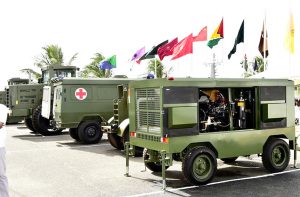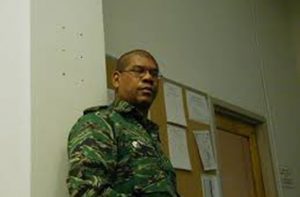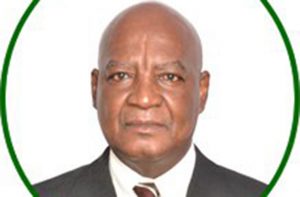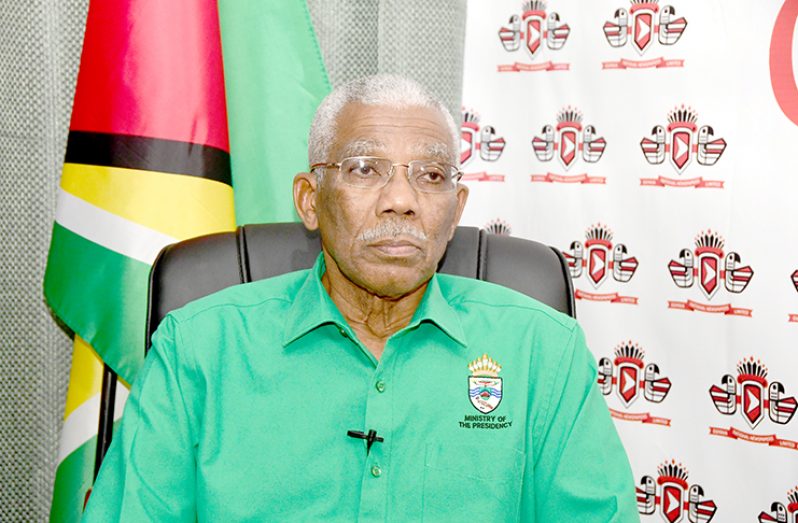…President reflects on Jagdeo’s ‘grievous interference in GDF’
By Svetlana Marshall
PRESIDENT David Granger, in rubbishing claims of interference in the Guyana Defence Force (GDF), said it was under the People’s Progressive Party/Civic (PPP/C) Administration that the GDF experienced the worse level of meddling which resulted in the discriminatory firing of staff and elevation of “favorites.”
It was the People’s Progressive Party (PPP) Presidential Candidate, Irfaan Ali, who had contended that the Government was interfering in the operations of the security forces. Ali, in his bid to outline his plans for the ‘men and women in uniform,’ had also alleged that members of the security forces are left with no other choice than to use obsolete equipment to execute their duties while operating under poor conditions.
President Granger, Commander-in-Chief of the Armed Forces, in debunking the claims, said the allegations are baseless. “I don’t interfere. I have certain responsibilities, I am Chairman of the Defence Board and I am also Minister of Defense,” he told Guyana Chronicle during an exclusive interview.

He said the Bharrat Jagdeo-led PPP Administration was responsible for the “most grievous interference” in the operations of the Defence Force and the Guyana Police Force, emphasising that it was under that Administration that GDF Colonels were unjustly removed from office and replaced by a favoured set.
Records show that in August, 2007, Jagdeo, while as President, bypassed four senior GDF officers and promoted their juniors. The Colonels – Frank Bispham, Lawrence Paul, Lindon Ross and Gordon Benn – were seconded from the Defence Force to the Public Service. They made room for Gary Best; Mark Phillips, Bruce Lovell and Andrew Pompey. The officers sidelined were all senior to the quartet. Jagdeo in a move that angered some in the army, promoted Commander Gary Best to Commodore, and Pompey, Bruce Lovell and Mark Phillips to substantive colonels. Pompey had replaced Colonel Lawrence Paul as the Deputy Chief-of-Staff; Lovell moved to Colonel, General Staff and Phillips who later became Chief-of-Staff headed force’s administration at the time of the incident.
The promotion of the officers meant that Paul was overlooked to replace Brigadier Edward Collins as head of the military at the time of his retirement, while Colonels Ross, Bispham and Benn were superseded. At a conference in August 2007, Jagdeo had defended his decision saying he had acted in accordance with the Defence Act which gave him the authority to appoint the Chief-of-Staff. He described the elevated officers as members of a new team which he said would lead the army into the future. He said that they were bright and well respected. Critics of Jagdeo’s decision to promote the officers had said that the Head of State had showed desperation in the supersession of the officers.
Collins had expressed his displeasure at the manner in which his successor was picked, declaring that due process was not followed and rejected the traditional farewell parade in his honour. His decision to break with the GDF tradition was seen as a snub of the force’s new administration. Collins himself was denied a promotion from Brigadier General to Major General before retiring.
No interference
President Granger vowed that political interference in the operations of the security forces will not happen under his watch. “I have never paid attention to that allegation because the accusers are the greatest abusers of the Military Command Structure, and it wouldn’t happen again. We have laid down clear rules for promotion, for advancement, for removal and I stick by the rules,” the Head of State told this newspaper.
GOVERNMENT POLICY

Annually, during the Officers Conference, the Commander-in-Chief of the Armed Forces, as President of Guyana, puts forward the Policies of his Government, and those, according to him, are the only source of ‘policy direction.’ As Chairman of the Defence Force, and Minister of Defence, he made it clear that he has not broken any code in terms of Military Administration.
Reports also suggest that under the Jagdeo-led PPP Administration, resources and developmental opportunities were limited within the security forces but the ‘tide’ has since turned.
Official records of the Guyana Defence Force (GDF) show that in a period of two years, under the Granger-led Administration, $2.5B in equipment were donated by China, while the force’s budgetary allocation was increased by 74 per cent. In less than four years, more than 400 men and women in uniform, from the defene force, have been granted scholarships to pursue higher education.
According to the records seen by the Guyana Chronicle, between 2017 and 2018, the Chinese People’s Liberation Army contributed $2.5B in engineering and other equipment to the Guyana Defence Force (GDF), thereby, boosting the force’s capacity to respond to the needs of the country.
Buses, patrol boats, bulldozers, an excavator, water tankers, fuel tankers, tipper trucks and off-road ambulances were among the equipment donated. Added to that, technical and military officers from the People’s Liberation Army conducted a series of training sessions with the GDF troops, on the use of the equipment.
FINANCIAL RESOURCES
Aside from the contributions made by external forces, the government has ramped up the GDF’s financial resources. In 2013, the GDF received approximately $7.2B. The following year, the Defence Force was allocated $8.044B; however, from then to now (2019), it has seen a 74 per cent increase.
According to the Force’s records, in 2019, it received $14.019B, of which $12.977B was

allocated for recurrent projects and programmes, and $1.042B for capital expenditures.
Since 2015, there has been significant recapitalisation of the Air Corps. The Force’s hangar, offices and operation centre have undergone rehabilitation while a passengers’ lounge with modern facilities (baggage scanner) has been constructed. Notably, the GDF has acquired four fixed-wing aircraft – two Britten Norman Islanders and two Shorts Sky Vans.
Additionally, added to its fleet is a Beachcraft King Air 350 Corporate aircraft. In the pipeline are plans to acquire four rotor-wing aircraft by the end of 2020.
For the academic year, 2016/2017, 129 officers and ranks received scholarships to attend the University of Guyana, the Government Technical Institute, the Guyana School of Agriculture, the Government Industrial Training Centre and the Critchlow Labour College, among other institutions.
For the academic year 2017/2018, 86 officers and ranks were awarded scholarships, and the following academic year (2018/2019), 110; and for the period 2019/2020, another 139 – a total of 464. The Hugh Wooding Law School, Institute of Distant and Continuing Education, Art Williams and Harry Wendt Aeronautical Engineering School and the Guyana School of Nursing are among the other institutions officers and ranks are being sent to. In the not so distant future, 27 persons will undergo training at the GUYSUCO Training Centre for a period of six months.
SECURITY REFORMS
President Granger said the changes that have taken place with the GDF and the Police Force have been supportive of the reforms, which are taking place. “The Defence Force, which is my direct responsibility, has had some reforms. We are strengthening the technical corps, particularly air, engineer, maritime, and communications. They are much stronger now. We have strengthened the Command Headquarters,” the Head of State pointed out.
Forming an important part of the GDF is the Guyana People’s Militia. The Militia, legally known as the Reserved Force, is being increased. The statistical target is meant to be 50 per cent of the regular force. This, President Granger said would allow easy mobilization of citizens, in every administrative region, in cases of emergencies, and when needed to perform security duties. “When an emergency occurs, not necessarily a military emergency such as an invasion or an insurrection, when a civil emergency occurs, like a flood or a fire, it means that members of the Defence Force could be deployed almost immediately,” the President explained. The National Cadet Corps Programme (NCCP) has also been reintroduced.



.jpg)








